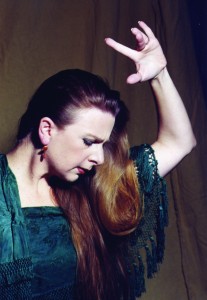
Flamenco’s Jewish roots
Ilisa Rosal, founder of Ballet Flamenco la Rosa, discusses her upcoming demonstration/lecture on different aspects of flamenco and its connection to Judaism as part of the monthly Guava Rugelach Lounge series, presented by downtown Miami cultural center Next @ 19th. A spin-off of the annual Guava Rugelach Festival, which takes place in August during Miami’s Jewish Music Festival, the Guava Rugelach Lounge series takes place in a cozy café environment, which is the perfect setting for artists to present and communicate their work in an intimate setting.
Neil de la Flor: How is flamenco related to Judaism? Ilisa Rosal: Flamenco is an art from that developed in medieval Andalucia when there was a cross-fertilization of cultures, and the Jews flourished in what has become known as The Golden Age. The Gypsies, Moors and Jews were the main influences in flamenco, along with European and African elements. The Jewish influence is most evident in certain genres of flamenco music and in some of the lyrics, which reflect the persecution of the Jews during the Spanish Inquisition, when the secret Jews, or Marranos, used flamenco music to disguise the expression of their experience. ND: Why is the flamenco so important to your aesthetic? IR: When I first discovered flamenco, I was immediately drawn to it as an art form that encompassed all of the aspects of dance and theater that I was pursuing. The power of the music and the lyrics as inspiration for the dance makes it a form of theater and not limited as many other dance forms are. Its aesthetic is dramatic, deeply emotional and exquisitely beautiful. It uses classic and deeply human imagery and, at the same time, is earthy and spiritual. It embodies the human condition with all of its conflicts, contradictions and triumphs. It is a universal language that I have chosen to use to explore, develop and express my artistic vision. ND: What should the audience expect, or what will they experience from Ballet Flamenco la Rosa on June 1? IR: On June 1, we will be presenting a lecture/demonstration about the Jewish influence on flamenco music. Our company guitarist/singer Paco Fonta will join me in demonstrating and explaining various aspects of the flamenco “palos,” or rhythms, both in the guitar and vocal music that have Jewish roots or relationships to the Jewish culture in Spain. ND: Any surprises? IR: For those who are not familiar with flamenco and its history, there will be a lot of surprising information. For those who are or are not familiar with the music alike, it will be an opportunity to focus on this beautiful art form in an intimate setting for a rare experience of the authentic voice of flamenco without the commercial trappings. Paco is a gifted musician and a privilege to work with. It will be a true pleasure to be part of this musical experience. ND: What were/are the most challenging aspects of producing these percussions/preparing for this event? IR: The most challenging aspect is that this event represents 30 years of work in this art form. We had to choose from a great deal of material to cover in a short time. ND: What’s next for Ballet Flamenco la Rosa? IR: Ballet Flamenco La Rosa performs at many community events. We also teach classes in flamenco dance, guitar and singing for students of all ages and all levels at PAN, Performing Arts Network. We are also creating an original flamenco ballet, “Directo al Corazon” (Direct through the Heart), inspired by the Henrik Ibsen play “Hedda Gabler,” for our 2012 season. Ballet Flamenco La Rosa, Wednesday, June 1, 2011 at 8 p.m. at Next @ 19th at137 N.E. 19th St., Miami), Tickets: $10 and $6 for students, seniors and artists. For a full schedule of classes and events, contact 305-899-7729 or [email protected]. PAN, Performing Arts Network, 13146 W. Dixie Hwy. North Miami.
Recent Content
-
Artsarticle ·
-
Artsarticle ·
-
Artsarticle ·

